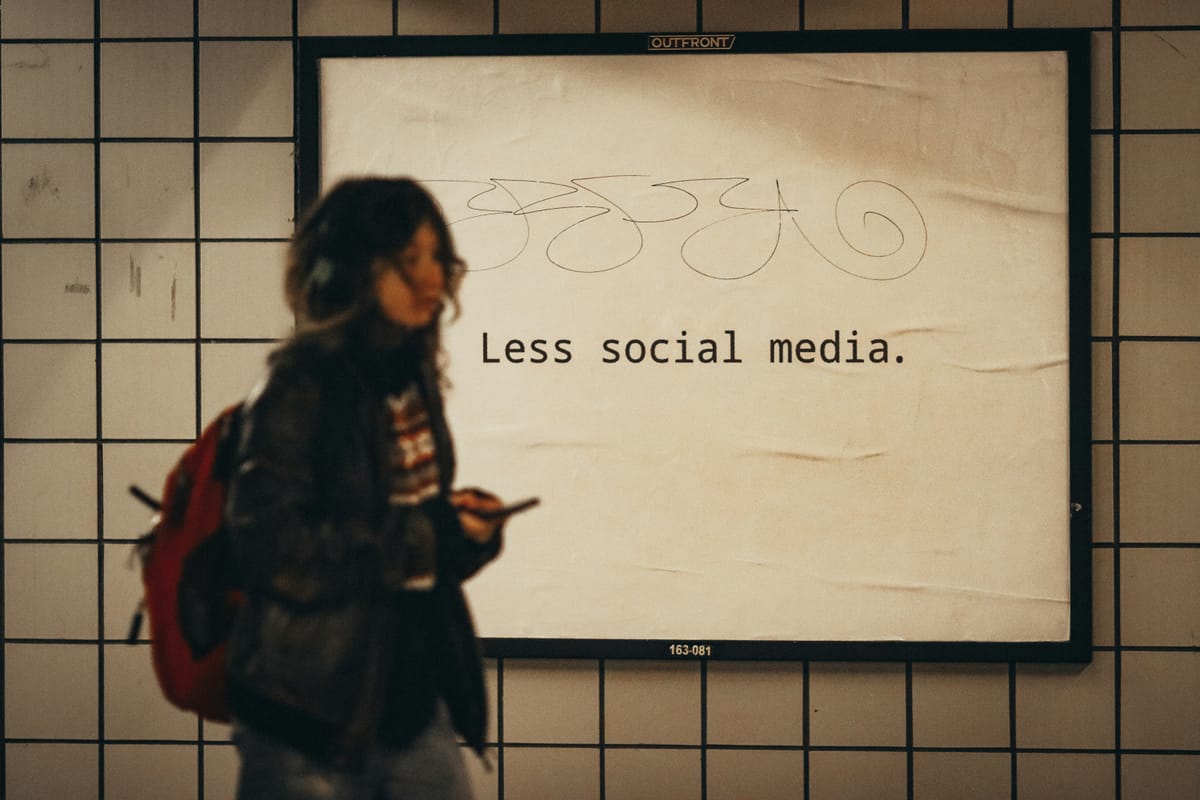The case for breaking social media in America
Social media is breaking us in America. You could argue it already has. But there is a solution.

Social media is breaking us. You could argue it already has. But there is a solution.
In 2024, I wrote at Cardinal & Pine that social media "is going to break America, or we’re going to break it."
A year has passed, and things have gotten worse.
Depending on your political leanings, your Facebook or TikTok feed is either convinced that murdered right-wing influencer Charlie Kirk was the second coming of Christ or the Devil himself. And the damaged young man accused of shooting him? He's either Che Guevara or Viktor Orbán with an Xbox and a 4chan account.
As if a man so damaged as to shoot someone for disagreeing with him would have a coherent political philosophy to blame.
And social media, like a dog rolling around on a dead thing, is reveling in it all. It's Charlie Kirk today. Next week it'll be some new political chasm. The details are interchangeable, the chasm isn't.
We will never have peace, at least not on social media, because we're not meant to.
Americans can't agree on much, but I'd wager they can come together around this idea:
Social media, the way it is constructed in 2025, is malignant. It is a civilizational succubus, a meta-sized Munchausen's syndrome, the guardian who gives you a spoonful of poison every day to keep you sick.
It isn't that Facebook and its ilk are left-leaning or right-leaning. Most social media companies say they have no ideology one way or the other. X, which is owned by right-wing activist Elon Musk, is the exception. But that isn't the point. It's that they profit, clearly, off everyone hating each other.
In 2025, it's no longer a mystery how the algorithm works. Disdain, vitriol, and hate—they make you viral. Thoughtfulness makes you obsolete. Before you can see how your friend celebrated their birthday, you have to scroll past all the dreck—the half-true memes, the celebrity side-boob, and the fear-farming.
Americans can't agree on much, but I'd wager they can come together around this idea: Social media, the way it is constructed in 2025, is malignant. It is a civilizational succubus. It's a meta-Munchausen's syndrome, the guardian who gives you a spoonful of poison every day to keep you sick.
Your 11-year-old's swimming around in it right now over on TikTok.
Once, we cracked down on the tobacco companies that sold us a physically addictive carcinogen and marketed it to children. When is it TikTok or Facebook's turn?
It goes beyond the personal. If the billion-dollar companies that profit from this space aren't held accountable for their gleeful amplification of malicious information, we cannot maintain a functioning, healthy democracy. There's no debating your differences if you can't agree on what's up and what's down.
It'll break us. You could argue it already has.
But there is a solution, and I'd wager that even our polarized nation would line up behind it.
Google 'Section 230'
Bear with me. Don't go to sleep or scroll away. This wonkiness is crucial, because social media has played an outsized role in making America what it is today.
In the 1990s, politicians in America wanted to protect burgeoning tech companies from any potential legal liabilities of the information they hosted. So they wrote Section 230 of the 1996 Communications Decency Act.
The internet is a place filled with many viewpoints. The idea is that companies that host those viewpoints on their platforms should not be held liable for them.
Social media didn't make people this ugly, but it did give them the platform to spread their ugliness on a large scale.
That immunity has helped to make companies like Facebook, Google, and YouTube fat and rich. And it's helped influencers grow fast, especially if they illicit a strong emotion one way or the other.
Here's the problem with that:
Under that 1996 law, social media companies are not treated like your newspaper or local TV station.
"If a news site falsely calls you a swindler, you can sue the publisher for libel," the Associated Press explained in 2023. "But if someone posts that on Facebook, you can’t sue the company — just the person who posted it."
But what about if the company is amplifying it?
We know some social media companies like Facebook have been "juicing" content that makes people engage, meaning it encourages you to respond with an angry emoji or share it, and most people only do that when they feel strongly about something.
According to The Washington Post's 2021 reporting, “The company’s data scientists confirmed in 2019 that posts that sparked angry reaction emoji were disproportionately likely to include misinformation, toxicity and low-quality news.”
More context:
"That means Facebook for three years systematically amped up some of the worst of its platform, making it more prominent in users’ feeds and spreading it to a much wider audience. The power of the algorithmic promotion undermined the efforts of Facebook’s content moderators and integrity teams, who were fighting an uphill battle against toxic and harmful content."
Is there any reason to believe Facebook, just the biggest and most visible of the perpetrators, is doing it differently today? Or that they're alone in the way they push content?
In 2023, after the death of my son, I wrote in The Atlantic about the way social media, especially X, allowed vaccination opponents to make up stories about how he passed—blaming it on the COVID-19 vaccine—and pass it around. I got thousands of hateful messages and death threats. I still do.
"Glad your son is dead propagandist faggot," someone wrote to me in July.
Social media didn't make people this ugly, but it did give them the platform to spread their ugliness on a large scale.

Taking away Section 230's immunity
Anyone who works in news and relies on social media to help promote their news content, like I do, knows that the best method for getting attention is easy if you have a keyboard and can think up a sufficiently noxious insult. Whether it's true or not is irrelevant.
The consequences are clear:
Its impacts on our mental health are well-documented. Political debate is an ever-churning storm of crap. I think of it like the Sarlacc in "Star Wars," an unquenchable, sentient hate hole that, as the story goes, slowly digests you over a thousand years. Those of us who've been on Facebook in the last year or so know the feeling.
It's designed to be addictive too, especially for children and teenagers, keeping you coming back for that shot of good or bad energy.
Because of social media companies, it has never been easier for people to tell lies that cause extraordinary harm, that spread unchecked, as it is now. Indeed, these are salad days for hate groups.
Your grandfather's Ku Klux Klan—with their bedsheets, their horses, and their burning crosses—are gone. Too inefficient, too sweaty. Long ago, they rebranded, got a social media account and leveled up.
Take Section 230's immunity away, or write some exceptions to it, and social media companies will have to moderate what they host on their platforms or be held responsible for it. They will have to place guardrails on this Mississippi River of bad information or pay for it.
It will not solve all our problems. There is no magic pill for this mess we're in. But it will help.
If that sounds like censorship to you, consider this: In America, you can say anything you want, but that doesn't mean there are no consequences for what you say. In the publishing industry, the consequences are specific—and potentially expensive.
If I printed in a newspaper that you are a convicted criminal and you're not, you could hold me and the newspaper liable in court for that.
It's good for journalism. It means that publishers can't just write false stuff. You violate that understanding and you can lose your job, your livelihood, and your platform. Social media companies have no such incentive to be decent.
Social media companies counter that they aren't the news publisher. They are the news stand. You can't blame the news stand for what you read on it, right?
But if social media companies are just news stands, then they're putting the toxic, malicious information front and center and throwing the rest in the trash.
It's like a paperboy who sets the paper on fire and throws it on your front porch.
They are, clearly, more than neutral bystanders. Their algorithm feasts on our pain and misery and then the social media company makes gobs of money off it.
If someone wanted to break a people into shards, they could not do better than what Facebook or X or TikTok is doing right now—an IV drip of spiteful, false, unsourced information.
When we logged in for the first time, we didn't ask for this.
In America, our problems may be deep and pervasive. Sometimes, we may be ugly. The reflection in the mirror might be unflattering, but it's not this—this fun house mirror making billions off our pain.
And it's past time we acknowledged that we don't have to live this way.
The Living South was created by NC journalist Billy Ball in 2025. It centers on the most interesting stories and people in the American South. Share this story with your friends and help The Living South grow.
If you enjoy The Living South, consider a small donation to support my work.






